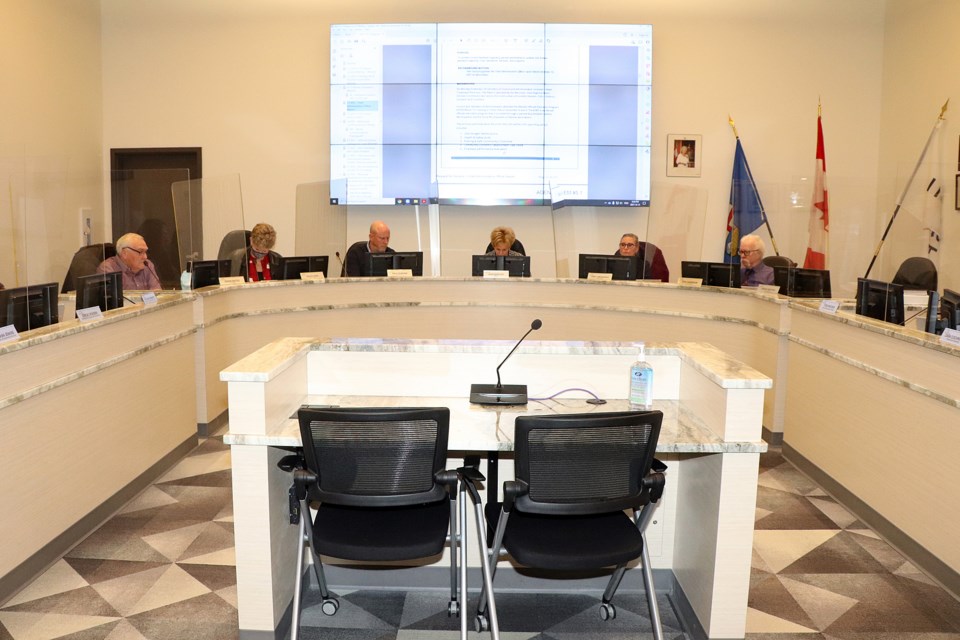INNISFAIL — The plight of the town’s escalating poverty cases and their failing mental health is now out in the open with town council unanimously supporting the creation of a community roundtable group to find solutions.
“We've got a complex issue here. It's not just one thing that we're going to fix it like that. It's large and it's complex,” said mayor Jean Barclay, adding the issue is far broader than just homelessness and addictions.
She said the roundtable group should include medical doctors, public health officials, social agency representatives, as well as RCMP and local and provincial politicians.
“I would like to just sit around and hear about the issues, and what needs fixing and where do we start?” she said.
On June 13, council was briefed with a trio of reports from staff and Innisfail RCMP that the problems were not only becoming increasingly worse but impacting hundreds of local citizens who are squeezed financially by a struggling economy with escalating inflation, and burdened by long hospital waiting lines to receive counselling and medical services.
“The thing that concerns me is we have to anticipate the amount of this problem is going to increase in the foreseeable future,” said Coun. Gavin Bates after the presentations.
“It's not getting better, and I think it's going to get a lot worse; just the reality of the economic situation.”
The trio’s presentations were the result of the passionate plea by Coun. Janice Wing on May 9th during the updated Community Standards Bylaw debate that the town needed to did deeper into why the bylaw was suddenly targeting panhandlers, and if it was a symptom for a long unnoticed or ignored homelessness problem.
Council then asked administration to come back with more detailed information.
“I was shocked when I heard the numbers. It was higher than what I thought,” said Wing. “Karen Bradbury's numbers around the numbers of calls that FCSS, which is essentially two people in the town office, get in a year from people looking for help is staggering. It's overwhelming.”
Bradbury, the town’s community and social development coordinator, told council her office had 464 “walk-ins” last year seeking help.
“I think just the fact that we stood up and said, ‘we have a problem’ and publicly acknowledged that we have a problem,” is a huge step for us,” added Wing of the roundtable initiative. “We've never had that conversation before.”
Bradbury began her presentation by telling council there is an increased need in the community for mental health supports with many showing suicidal ideation, and individuals struggling with access to services because of long waiting times.
She said a big issue is lack of affordable housing, especially for vulnerable citizens on fixed incomes. She told council her office is seeing more cases of couch surfing, people tenting, and individuals moving from one location to another for a variety of reasons or barriers, including having a pet.
“Almost everybody that we speak to that has a pet and looking for a place are not accepted because they have a pet. That’s a huge barrier for many of our individuals,” said Bradbury.
“They will say they'd rather not give up their pet because their pet is sometimes the reason why they still continue to have hope for tomorrow.”
She said her staff has seen “quite a number” of seniors at risk of becoming homeless, such as those losing a partner and forced to cover a mortgage with just one income.
“We've heard stories of seniors living on toast because they are paying for their utilities,” said Bradbury. “They're nervous about getting cut off their utilities. That is the reality for some of our folks.”
Gary Leith, the town’s manager of fire and protective services, said the work done by his peace officer staff has shown there's been an increase in homelessness, adding the issue is tied into addictions, mental health, economic factors, and domestic issues.
He told council the situation now includes people who don’t want to be in Red Deer because the availability of drugs and the environment is too concerning.
“So, they move out into smaller communities and are looking for supports,” he said. “We have seen people who dumpster dive and quite recently people who are generally just looking for a meal, and some shelter.
“The peace officers do an outstanding job interacting and are the first point of call is to find out what that story is. It's not where enforcement wear the uniform, it's to provide some form of relationship and engage them and find out what the story is to try and assist them as best we can.
It’s increasing unfortunately. We have seen an increase in those activities where probably in my first three years here we had one person who was homeless; now we're seeing it on a regular basis.”
Innisfail RCMP Sgt. Ian Ihme said the problem with his detachment’s response with individuals with mental health issues is not the number of calls but the slow service provided by hospitals, which he added, causes problems for the town as the delays take police officers way from local streets.
Ihme said detachment records show that in the past two months Innisfail RCMP has responded to 34 mental health complaints, with eight requiring police to lay charges under the Mental Health Act and transporting them to area hospitals for mental health assessments.
He said there were two cases where an individual had to be transferred to Calgary or Edmonton.
“From our perspective where the system is falling down it’s not necessarily us. It's not even necessarily the hospital itself, but it's Alberta Health Services and their peace officer program,” said Ihme.
“So, once you know there's a peace officer that's able to take over from us, we can leave the patient at the hospital. But that just never seems to be the case that they have that.”



